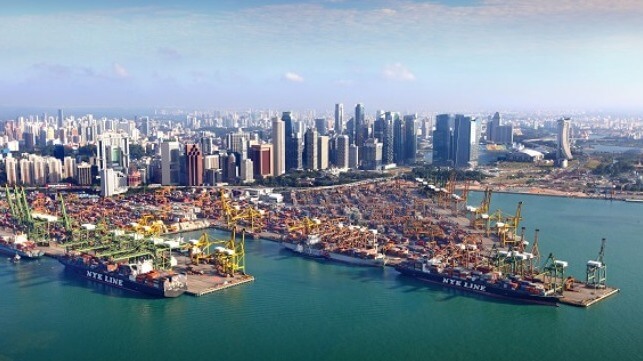Southeast Asia’s First Green E-Methanol Plant Planned for Singapore

Singapore is the latest to join in the continuing efforts to build a global infrastructure for the production and supply of methanol as a marine fuel. Already known as the world’s largest bunkering hub for the shipping industry, a partnership between shipping and the fuel industry plans to establish the first green e-methanol plant in Southeast Asia in Singapore. Already considered a leading near-term contender as an alternative fuel to meet the IMO’s 2030 and 2025 goals to reduce carbon emissions, the new initiative would be a major step in developing the necessary infrastructure.
A.P. Moller – Maersk which has been leading the global efforts at developing the production and supply chain is jointing with PTT Exploration and Production Public Company, Air Liquide, YTL PowerSeraya, Oiltanking Asia Pacific, and Kenoil Marine Services to explore establishing a green e-methanol plant that converts captured biogenic carbon dioxide into a marine fuel. The companies plan to complete a feasibility study by the end of 2022 and pending its conclusions anticipate building a pilot plant in Singapore.
According to the agreement, the companies will launch a Green Methanol Value Chain Collaboration that will explore the feasibility of establishing a green e-methanol pilot plant. They anticipate a minimum production capacity of 50,000 tons per annum. According to the partners, their new agreement marks a pivotal step towards transforming captured biogenic CO2 and green hydrogen produced from renewable electricity into green e-methanol, making this low carbon fuel commercially accessible for the maritime industry.
“As one of the world’s premier maritime bunkering hubs, Singapore will serve as an ideal location to take this important step towards exploring alternative future fuel solutions to advance the multi-fuel transition of the global shipping industry,” they said in announcing the project. The Maritime and Port Authority of Singapore welcomed the formation of this industry partnership and its plan to leverage Singapore’s hub port and research ecosystems to conduct the feasibility study.

that matters most
Get the latest maritime news delivered to your inbox daily.
Maersk as the first large shipping company to order next-generation vessels that will operate on methanol has also been a leader in the global effort to develop the supply chain and infrastructure. In addition to early investments in Europe and the United States, in March they announced efforts to start the first global supply chain for methanol. Partnering with six companies, Maersk reported that it had laid the groundwork which when scaled by 2025 will supply well beyond the green methanol needed to fuel the line’s first 12 methanol-ready dual-fuel containerships. Leading the industry, they also hope to encourage other shipowners to follow and point to the recent announcements of other companies ordering methanol-ready vessels.
Experts point to the advanced state of development for methanol saying that it has the potential to make significant contributions in the near term at substantial carbon reductions. Methanol is being positioned as the only market-ready and scalable solution ready for the industry with expectations that ammonia which is also considered a strong contender could require at least two more years of development before being ready for the commercial market.
